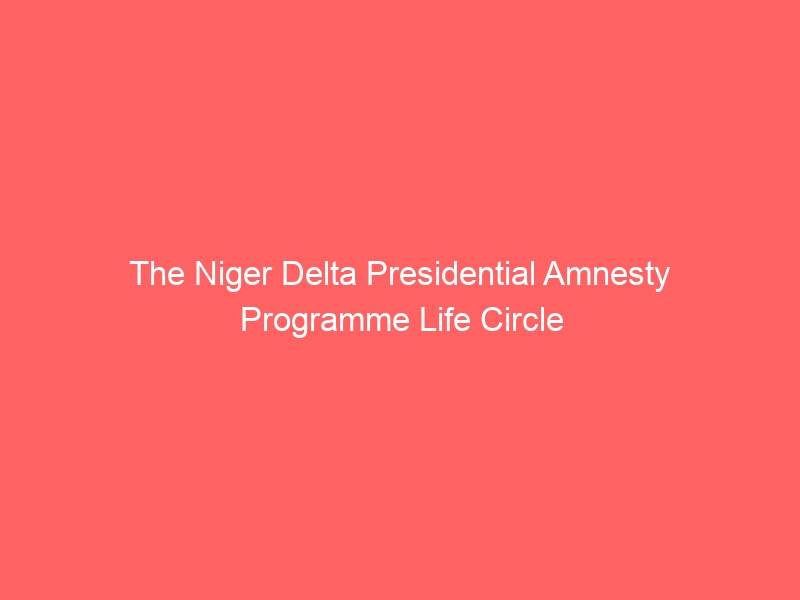The Niger Delta Presidential Amnesty Programme Life Circle
By Jerome-Mario Chijioke Utomi
On 25 June 2009, President Umoru Yar’Adua (now late) granted presidential amnesty to Niger Delta militants who had directly or indirectly participated in the commission of offences associated with militant activities in the Niger Delta, and who were willing to surrender their weapons and renounce armed struggle within a 60-day ultimatum (6 August–4 October 2009). The government targeted up to 10,000 militants whose attacks in the six Niger Delta states have cost the country a third of its oil production.
The programme was meant to stand on a tripod.
First leg of the tripod was targeted at the disarmament and demobilization process; the second phase to capture rehabilitation which is the training processes, while the third phase is the Strategic Implementations of Action Plan towards holistic development of the Niger Delta region. Similarly, going by available information at the public domain, after the rehabilitation programme, they are to be reintegrated into their various communities through vocational skills training, formal education or entrepreneurship skills acquisition either in Nigeria or abroad, depending on ex-militants’ interests. The reintegration programme ranges from six months to five years of training.
Without any shadow of the doubt, the programme has in the last fourteen years of its existence restored what analysts’ describe as relative peace in the region.
However, in the last decade also, Nigerians with critical interest have asked questions about some grey and unclear aspects of the programme. For instance, many have asked these questions for too long and too often and received responses that seem to be substantive but actually they are not. And some of these citizens are today, feeling as if they are being manipulated. Some have expressed their opinion and feelings about the programme without receiving responses from the operator, and they are feeling ignored. To the rest, Nigeria’s communication environment provides little opportunity for one to express oneself about the programme and as a result, they are feeling discouraged. To this group, their frustration is further fed by the awareness that responses/feed they receive from the media grows/breeds cynicism.
Synoptically, while the programme is still up and running with no end in sight and have within this period under review recorded a very high rate of turnover of Coordinators making many to wonder if the Act establishing the programmme made no provision for tenured period for Coordinators, the question begging for answer(s) are; how long was the Presidential Amnesty Programme initially structured to last? How many Ex-Militant were originally enlisted for the programme? How many have been trained? How many are still undergoing training? What stage is the programme; Disarmament and demobilization process, rehabilitation/ training processes, or the Strategic Implementations/ Action Plan for the holistic development of Niger Delta as a region?
How many of the Ex-militants are still receiving training? How many are currently receiving allowance? What is the amount? Is it the same amount approved right in 2008 or has it been reviewed? What is the fate of those that were youthful then, but today mature adults with families? Are they still dependent on the stipend as approved in 2008 or has the Amnesty Office reviewed such allowances upward to accommodate their new status?
Most importantly, with the advent of Petroleum Industry Act (PIA) which provides 3% for the oil bearing/host communities, it will again elicit the question as to; when is the Federal Government going to wrap up the Amnesty programme? Or was it planned to last forever? If yes, what is the plan in place to make the Office self-sustaining?
Providing answers to these questions and drawing experience from similar programmes as implemented abroad are the two objectives of this piece.
Talking about a similar programme at the global stage and its inherent benefits, a particular one that naturally comes to mind is Burundi’s demobilization programme, described as a social transfer programme combining cash and in-kind benefit and lasted between 2004 to 2010.
As documented by Olivia D’ Aoust, Olivier Sterok and Philip Verwimp, the 1993-2009 conflict in Burundi was driven by years of ethnic discrimination. In the year 2000, the Arsha Peace Agreement laid the foundation for a peace process and a new constitution based on power-sharing and de-ethnicized political competition.
The programme was coordinated by the World Bank, and organized in three phases; the demobilization, reinsertion, and reintegration. The demobilization phase started with disarmament followed by the transfer of the combatants to the demobilization centre. Ex combatants spent eight days in the centre, attending training on economic strategies and entrepreneurship opportunities as well as peace and reconciliation.
As part of the reinsertion phase, demobilized combatants received a cash allowance worth months’ salary, paid in four installments over a period of eighteen months. Demobilized combatants received the first re-insertion payment when leaving the demobilization centre, called the transitional Subsistence Allowance (TSA) by the World Bank, the reinsertion money was dedicated to ‘enable an ex-combatant return to their community and to sustain themselves and their families for a period of time.
Comparatively, when one juxtaposes this account with our amnesty model, the missing link becomes evident. There is a long history of inabilities on the part of the nation’s successive amnesty handlers to come up with, and implement a well-foresighted plan as demonstrated in Burundi. These particular failure/failings have forced many Nigerians at different times and places query the handler’s intelligence and in some cases concluded that most of the coordinators lack distinct set of aptitude a leader must demonstrate in three central context of work; the accomplishments of task, working with and through other people, and judging oneself and adapting one’s behaviors accordingly.
While the key difference determining the success of Burundi programme and unending failures of Nigeria’s experiment lies in leadership, there are however other observations to make and truths that this piece needs to underline.
First, apart from stakeholders questioning the wisdom behind teaching a man to fish in an environment where there is no river to fish or training a man without job creation plan, how will FG explain the fact that the amnesty initiative which was programmed to empower the youths of the region via employment has finally left the large army of professionally-trained ex-militants without job. In fact, the region and of course the nation is in a dire state of strait because unemployment has diverse implications.
Under the present circumstance, what the Federal Government seems to have forgotten is that security wise, large unemployed youth population is a threat to the security of the few that are employed, and any transformation agenda that does not have job creation at the centre of its programme will take us nowhere’,
Presently, this threat has become more pronounced in the oil-rich region of the country with the chunk of the proponents spearheaded by the large army of professionally trained ex-militants currently without a job. Proper management of these teaming youth is the panacea.
Finally, analysts say that while the amnesty offer is a positive move, the government has not yet shown a willingness to tackle the underlying problems in the region. Instead of continuing with this endless amnesty, it is important that to solve the problem of the region, Federal Government needs to abandon Presidential Amnesty Programme and in its place, implement the recommendation by a government-appointed committee, which a few years ago, stated that Niger delta states should receive 25% of the country’s oil revenue, as against the present 13%.
Utomi Jerome-Mario is the Programme Coordinator (Media and Public Policy), Social and Economic Justice Advocacy (SEJA), A Lagos-Based Non Governmental Organization (NGO).And could be reached via Jeromeutomi@yahoo.com /08032725374












